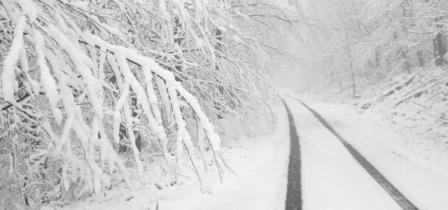Winter can be a fun season, bringing holidays, pretty snow, and winter sports. It can, however, also be a very difficult time. Use our checklist to make sure you're prepared for any winter event.
Winter Checklist
Outside Items To Have On Hand
Snow shovel
De-icing compound
Waterproof floor mats
Inside Items To Have On Hand
Household emergency supplies should include enough food, water, and supplies to last four days without power or help.
Canned meats, soups and stews, cereal, and energy bars
Manual can opener
Paper plates, cups and plastic utensils
1 gallon of water per person per day (allow enough for four days)
Flashlights and batteries
Battery- or solar-powered radio
Battery- or solar-powered clock
Cellular phone
First-aid kit
Four-day supply of prescription medicines
Blanket and cold-weather clothing for each family member
Pet food and additional water for household pets
For Traveling
Check antifreeze
Check and replace older batteries
Keep the gas tank near full to avoid freezing water in the fuel line
Check tires and spare tire for proper inflation
Automobile emergency supplies
Bag of sand, road salt or non-clumping cat litter.
Ice scraper
Jumper cables
Small shovel (to dig snow away from wheels, or scatter sand on roadway)
Tire chains (every driver should practice putting them on)
Flares or reflective triangle to warn other motorists if you break down
Blanket
Flashlight and batteries
Gallon jug of drinking water
First-aid kit
Jacket, hat, gloves and sturdy, snow-proof boots for each traveler
Nonperishable food
Cell phone
Money (cash)
Other Things to Keep in Mind
To help prepare yourself and your family for the winter, keep these other things in mind:
Winter-proof your home. During the warmer months, you should winter-proof your home as much as possible. Doing this will keep you prepared for severe weather, power outages, and will reduce your energy bill. If your house lacks insulation, have it installed. Prepare your home with caulking and weather stripping. Fix any remaining draft issues.
Make sure your carbon monoxide detectors are working. You should have one carbon monoxide detector on each level of your home. Make sure they work correctly; they should be tested once a year. Since your home will be sealed up in the winter, the risk of carbon monoxide poisoning is higher. Know the signs of carbon monoxide poisoning.
Have an emergency plan. In the event that you lose power for an extended amount of time, your family needs to be prepared. Talk to them about what your plan will be in this situation, and get everyone involved in preparation.
Remember that you may not have cell access during an extended winter event. Severe winter weather can knock out power, which could interrupt cell service. Many solar-powered radios have phone chargers in them, but you shouldn't be reliant on your phone during an extended power outage or winter emergency. Consider getting a HAM radio license for communication in a disaster. Unlicensed people can still use a HAM radio in an emergency.
Watch weather reports. A lot of times, you'll receive advance warning for a winter storm. Ideally, you should have all your supplies in order already. If you don't, try to get to the store as quickly as you can. A lot of people will rush to the store in a panic when they find out a winter storm is coming, which can strip shelves and leave you without necessary supplies.
